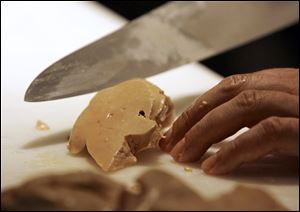
COMMENTARY
Ducking the foie gras ban
7/24/2012
Foie gras is a much-prized delicacy made from the enlarged livers of geese and ducks that have been force fed a few times every day. Critics of the practice, who are often animal-rights activists, claim it is barbaric, cruel, and an example of mankind exerting an illegitimate primacy over other living things. Supporters of the practice say that, because of the birds' unique physiology, briefly force feeding them does not even cause them discomfort.
The Great California Foie Gras Debate is roaring back again.
That's roaring, as in the Roaring Twenties.
According to an article by Associated Press reporter Fenit Nirappil, the state's controversial ban on foie gras lasted just a few weeks before restaurants figured out how to get around it.
Foie gras is a much-prized delicacy made from the enlarged livers of geese and ducks that have been force fed a few times every day. Critics of the practice, who are often animal-rights activists, claim it is barbaric, cruel, and an example of mankind exerting an illegitimate primacy over other living things. Supporters of the practice say that, because of the birds' unique physiology, briefly force feeding them does not even cause them discomfort.
Besides, they say, foie gras is delicious.
The California ban took effect on July 1, but some restaurants have chosen to look for loopholes to continue serving it.
The Presidio was an old military garrison right on the San Francisco Bay that served as a post for Spanish, Mexican, and American armed forces. In 1994, the picturesque site was turned over to the National Park Service. On its premises in an old barracks is a popular restaurant called the Presidio Social Club. It serves northern California cuisine, which happens to include foie gras.
How can they get away with it? They are claiming they are located within a national park, so technically they are on federal land and therefore not subject to the ban. In that sense, it is similar to restaurants in casinos on Indian reservations that can also legally sell it.
Two restaurants (Hot's Kitchen, an upscale wings-and-tacos joint in Hermosa Beach, and Chez TJ in Mountain View) are giving it away as a free item on other dishes. They point out that the ban is on the production and sale of foie gras, not its distribution. At Hot's Kitchen, they put it out as a side dish with a hamburger for a not-at-all unreasonable $13.
Other restaurants, including Palio d'Asti in San Francisco, offer to cook it for anyone who brings it in, another way to serve it without producing or selling it.
The man who introduced the law, former state Sen. John Burton, is furious at these efforts to bypass it. Meanwhile, the executive director of the Golden Gate Restaurant Association, Rob Black, plays it innocently: "You don't know what's legal. It creates confusion what restaurants or distributors can or can't do."
It seems as if a spirit of open lawlessness is already springing up around the ban, similar to what happened the last time a bunch of legislators decided to keep people from something they wanted. It looks like it's Prohibition all over again.
One can imagine foie gras speakeasies where patrons descend a shady staircase off a back alley. They knock three times (twice fast, once slowly), say the secret phrase ("duck liver") and are admitted into a lively underground restaurant where a great band plays hot jazz in the corner while the happy, laughing patrons eat tray after tray of forbidden foie gras.
Some people will try to make foie gras in their bathtubs ("Honey, what's all that quacking?") until organized gangs begin shipping it in illicitly from across the border in Canada, especially French Canada. These bootlegging bandits will soon square off against each other in battles for territory distribution, with drive-by shootings and spilled liver in the streets.
Perhaps they will use tommy guns for the sake of nostalgia, which would be a nice touch, and cars with running boards. And when one powerful gang goes after another, perhaps on St. Valentine's Day, you know the feathers will fly.
As in Prohibition, it could get dangerous. If you find yourself stuck between two warring foie gras fans, don't forget to … duck.
Contact Daniel Neman at dneman@theblade.com or 419-724-6155.